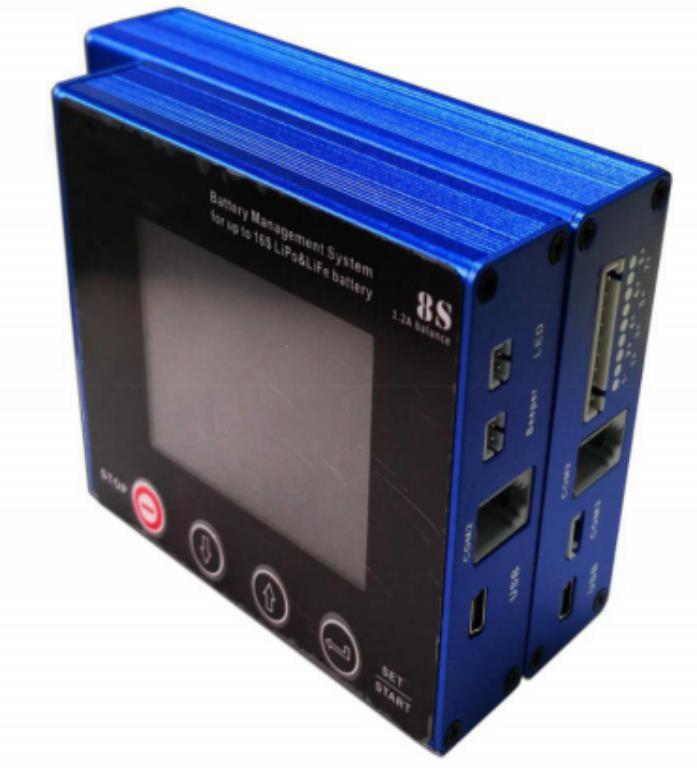A battery protection board, also known as a battery management system (BMS), is an essential component in lithium-ion batteries and other rechargeable battery systems. Its primary function is to monitor, control, and safeguard the battery during charging, discharging, and storage to ensure safe and efficient operation. Here are the key functions of a BMS:
Overcharge Protection: The BMS prevents the battery from being overcharged by monitoring the battery voltage during the charging process. When the battery reaches its maximum safe voltage level, the protection board interrupts the charging current to prevent further charging, protecting the battery from damage and potential safety risks.
Over-Discharge Protection: Similarly, the BMS prevents the battery from being discharged beyond its safe lower voltage limit. It constantly monitors the battery voltage during discharge and cuts off the power output when the voltage drops to a critical threshold. This feature prevents deep discharge, which can damage the battery’s capacity or cause irreversible damage.
Cell Balancing: In multi-cell battery packs, the BMS ensures that each individual cell is charged and discharged uniformly. Cell balancing involves equalizing the voltages of all cells in the pack to maintain their capacity and performance consistency. The protection board redistributes energy between cells, helping to prevent imbalances that could lead to reduced overall battery capacity and potential safety hazards.
Temperature Monitoring and Protection: The BMS continuously monitors the temperature of the battery. If the temperature rises to unsafe levels, the protection board can activate cooling mechanisms or reduce the charging/discharging current to prevent overheating. Thermal protection helps maintain the battery’s longevity, performance, and safety.
Short Circuit Protection: In the event of a short circuit, where the positive and negative terminals of the battery are inadvertently connected, the BMS quickly detects the abnormal current flow and cuts off the circuit to prevent excessive current discharge, potential damage to the battery, and associated safety risks.
State of Charge (SOC) Monitoring: The BMS estimates and tracks the battery’s state of charge, providing information about the remaining capacity or energy available. SOC monitoring helps users accurately assess the battery’s charge level and plan their usage accordingly.
Communication and Data Management: Many advanced BMS designs incorporate communication interfaces, such as CAN bus or UART, to exchange information with external systems or devices. This enables real-time monitoring, reporting of battery parameters, and integration with larger energy storage systems or electric vehicle management systems.
By performing these vital functions, a battery protection board ensures the safe and efficient operation of the battery, prolongs its lifespan, and minimizes the risk of hazards like overcharging, over-discharging, thermal runaway, or short circuits. Battery protection boards play a crucial role in enhancing the overall performance, safety, and reliability of lithium-ion and other rechargeable battery systems.

Choosing a Battery Management System (BMS) offers several advantages and is highly recommended for various applications involving rechargeable lithium batteries. Here are the key reasons why you should choose a BMS:
- Safety: One of the primary reasons to choose a BMS is safety. The BMS provides critical protection features such as overcharge protection, over-discharge protection, short circuit protection, and temperature monitoring. These functions prevent potentially hazardous situations such as battery damage, thermal runaway, fires, or explosions. By investing in a BMS, you prioritize the safety of yourself, your property, and others who interact with the battery system.
- Battery Longevity: A BMS helps optimize the lifespan of batteries by ensuring they are operated within their safe operating parameters. Overcharging or over-discharging a battery can significantly reduce its lifespan. The BMS monitors the battery voltage, current, and temperature, preventing these detrimental conditions and extending the overall life of the battery. By maximizing battery longevity, you can reduce the frequency of battery replacements and associated costs.
- Performance Optimization: A BMS helps optimize the performance of the battery system. It monitors and balances individual cell voltages in multi-cell battery packs, ensuring that each cell is charged and discharged uniformly. This balancing process improves overall battery capacity, extends runtime, and maintains consistent performance across the battery pack. Additionally, the BMS provides accurate state-of-charge (SOC) information, allowing you to monitor the remaining capacity and plan battery usage effectively.
- Efficient Energy Management: BMS systems are designed to maximize energy efficiency. They minimize energy losses during charging and discharging processes, improving the overall energy utilization of the battery system. By implementing sophisticated charging algorithms and controlling the power flow, the BMS optimizes energy transfer, reducing wastage and enhancing the system’s overall efficiency.
- Data Monitoring and Analysis: Many BMS systems offer advanced data monitoring and analysis capabilities. They provide real-time information on battery parameters, including voltage, current, temperature, SOC, and more. This data enables you to monitor the health and performance of the battery system, detect any abnormalities or deviations, and make informed decisions regarding maintenance, usage patterns, and optimization strategies.
- Compatibility and Integration: BMS systems are designed to be compatible with various battery chemistries and can be tailored to specific application requirements. They can integrate with other control systems, communication protocols, or energy management systems, allowing seamless integration into larger-scale applications such as electric vehicles, renewable energy systems, or grid storage systems.
- Compliance with Standards and Regulations: In many industries and applications, compliance with specific standards and regulations is necessary. BMS systems help meet these requirements by providing the necessary safety features, monitoring capabilities, and documentation. Compliance ensures that your battery system meets industry standards, safety codes, and regulatory obligations.
By choosing a BMS, you ensure the safety, longevity, and optimal performance of your battery system. It provides essential protection features, balances cell voltages, optimizes energy management, enables data monitoring and analysis, and ensures compliance with industry standards. Whether you are using batteries for personal devices, electric vehicles, energy storage systems, or other applications, a BMS is a crucial component that enhances reliability, efficiency, and peace of mind.
